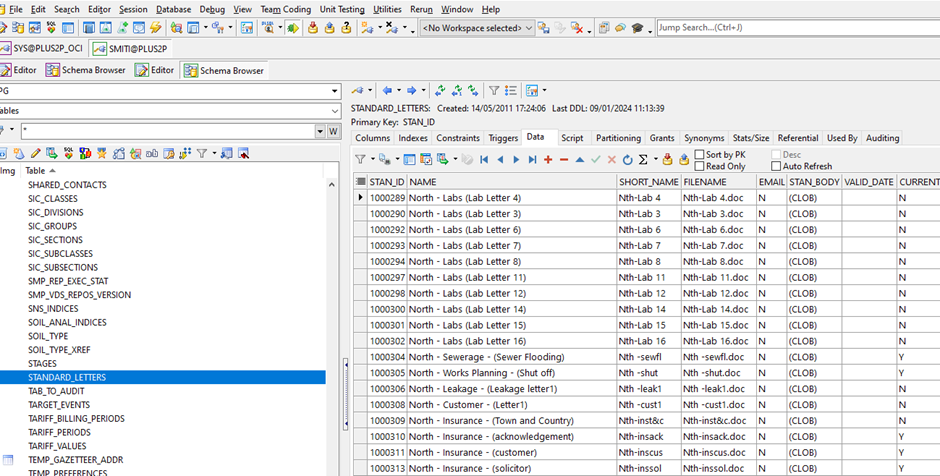Wanted to compare a sequence value with a max value in a corresponding table.
The declare -n option not available in the bash shell on the server (surprised as new OCI build and thought bash would be greater than 4.2) but this worked in ksh.
#!/bin/ksh
monitor=(
[sys1]=(seqname="SEQ_SAMPLE_KEY0" tablename="SAMPLE" rowname="ID_NUMERIC" )
[sys2]=(seqname="SEQ_TEST_TEST_NUMBER" tablename="TEST" rowname="TEST_NUMBER")
[sys3]=(seqname="SEQ_ACCESS_LOG_KEY0" tablename="ACCESS_LOG" rowname="SESSION_ID")
[sys4]=(seqname="SEQ_AUDITOR_DATA" tablename="AUDIT_DATA" rowname="DATA")
[sys5]=(seqname="SEQ_AUDITOR_EVENT" tablename="AUDIT_EVENT" rowname="EVENT")
[sys6]=(seqname="SEQ_AUDITOR_TRANSACTION" tablename="AUDIT_TRANSACTION" rowname="TRANSACTION")
)
for sys in ${!monitor[*]}; do
exit | sqlplus -silent user/password@TESTDB << EOF
set head off
set feedback off
set lines 200
set serveroutput on
DECLARE
x integer;
y integer;
CURSOR cur1 is select last_number from dba_sequences where sequence_name = '${monitor[$sys].seqname}';
CURSOR cur2 is select max(${monitor[$sys].rowname}) from ${monitor[$sys].tablename};
BEGIN
OPEN cur1;
OPEN cur2;
FETCH cur1 into x;
FETCH cur2 into y;
dbms_output.put_line ('${monitor[$sys].seqname}' || ' is ' || x || ' but max(' ||'${monitor[$sys].rowname}' || ')' || ' from '||'${monitor[$sys].tablename}' ||' is ' || y );
IF (x > y) then dbms_output.put_line('sequence is greater');
IF (x < y) then dbms_output.put_line('sequence is lower');
END IF;
ELSE
dbms_output.put_line('values the same');
END IF;
CLOSE cur1;
CLOSE cur2;
EXCEPTION
WHEN OTHERS THEN
raise_application_error(-20001,'An error was encountered - '||SQLCODE||' -ERROR- '||SQLERRM);
END;
/
EOF
done
SEQ_SAMPLE_KEY0 is 2867468 but max(ID_NUMERIC) from SAMPLE is 2867467
sequence is greater
SEQ_TEST_TEST_NUMBER is 22019029 but max(TEST_NUMBER) from TEST is 22019028
sequence is greater
etc....
monitor=(
[sys1]=(seqname="SEQ_SAMPLE_KEY0" tablename="SAMPLE" rowname="ID_NUMERIC" )
[sys2]=(seqname="SEQ_TEST_TEST_NUMBER" tablename="TEST" rowname="TEST_NUMBER")
[sys3]=(seqname="SEQ_ACCESS_LOG_KEY0" tablename="ACCESS_LOG" rowname="SESSION_ID")
[sys4]=(seqname="SEQ_AUDITOR_DATA" tablename="AUDIT_DATA" rowname="DATA")
[sys5]=(seqname="SEQ_AUDITOR_EVENT" tablename="AUDIT_EVENT" rowname="EVENT")
[sys6]=(seqname="SEQ_AUDITOR_TRANSACTION" tablename="AUDIT_TRANSACTION" rowname="TRANSACTION")
)
for sys in ${!monitor[*]}; do
exit | sqlplus -silent user/password@TESTDB << EOF
set head off
set feedback off
set lines 200
set serveroutput on
DECLARE
x integer;
y integer;
CURSOR cur1 is select last_number from dba_sequences where sequence_name = '${monitor[$sys].seqname}';
CURSOR cur2 is select max(${monitor[$sys].rowname}) from ${monitor[$sys].tablename};
BEGIN
OPEN cur1;
OPEN cur2;
FETCH cur1 into x;
FETCH cur2 into y;
dbms_output.put_line ('${monitor[$sys].seqname}' || ' is ' || x || ' but max(' ||'${monitor[$sys].rowname}' || ')' || ' from '||'${monitor[$sys].tablename}' ||' is ' || y );
IF (x > y) then dbms_output.put_line('sequence is greater');
IF (x < y) then dbms_output.put_line('sequence is lower');
END IF;
ELSE
dbms_output.put_line('values the same');
END IF;
CLOSE cur1;
CLOSE cur2;
EXCEPTION
WHEN OTHERS THEN
raise_application_error(-20001,'An error was encountered - '||SQLCODE||' -ERROR- '||SQLERRM);
END;
/
EOF
done
SEQ_SAMPLE_KEY0 is 2867468 but max(ID_NUMERIC) from SAMPLE is 2867467
sequence is greater
SEQ_TEST_TEST_NUMBER is 22019029 but max(TEST_NUMBER) from TEST is 22019028
sequence is greater
etc....


